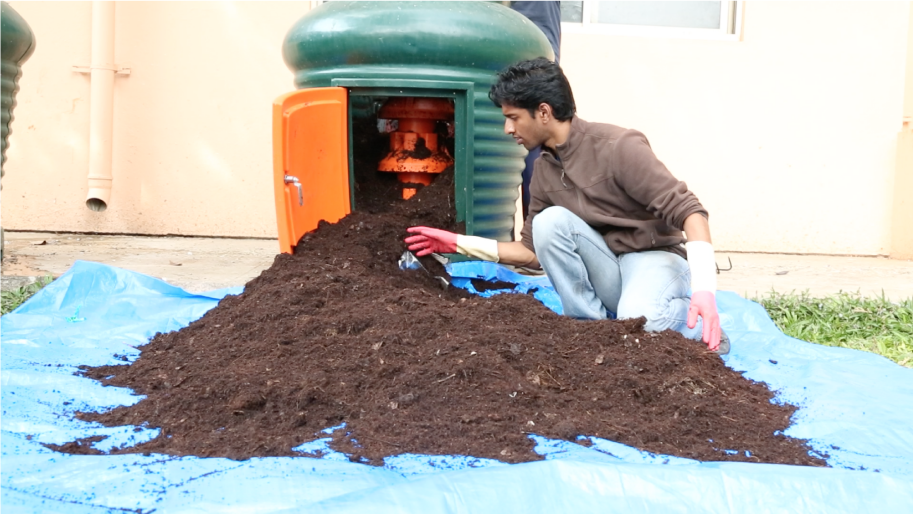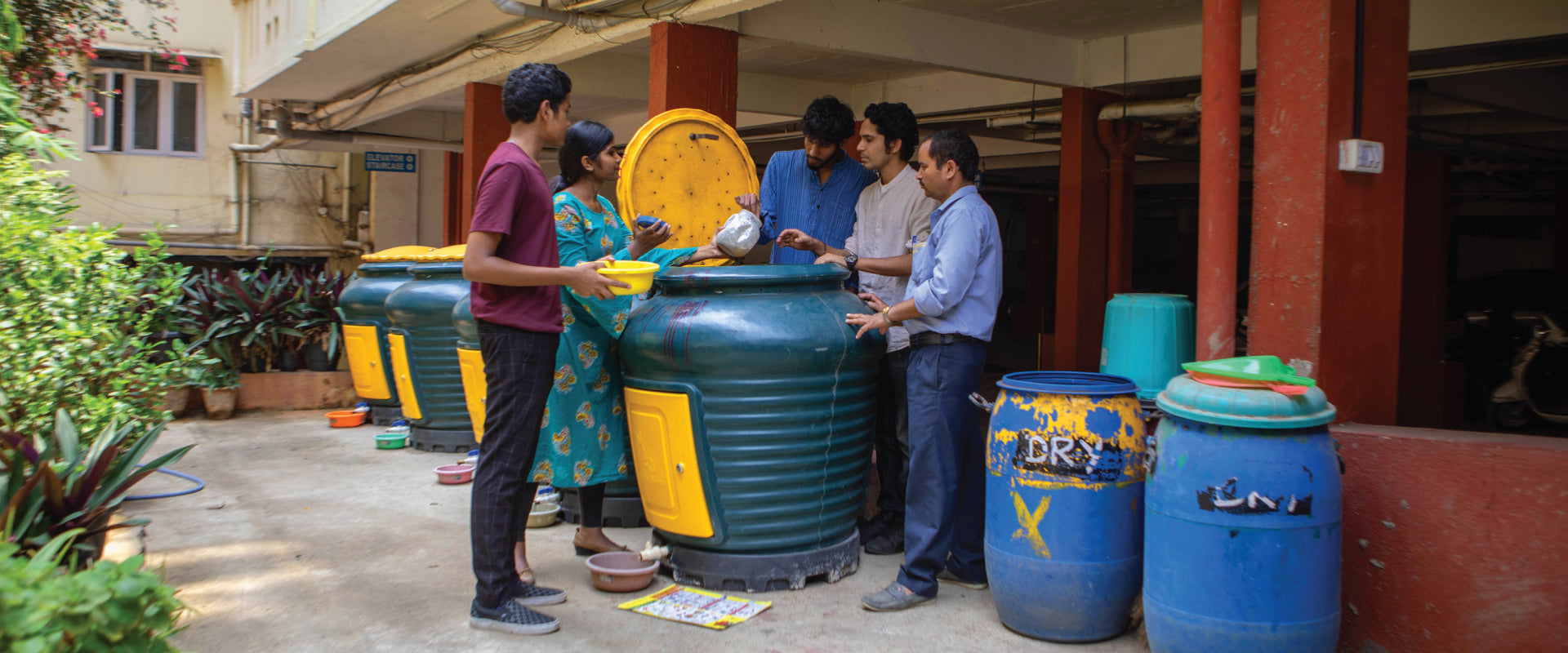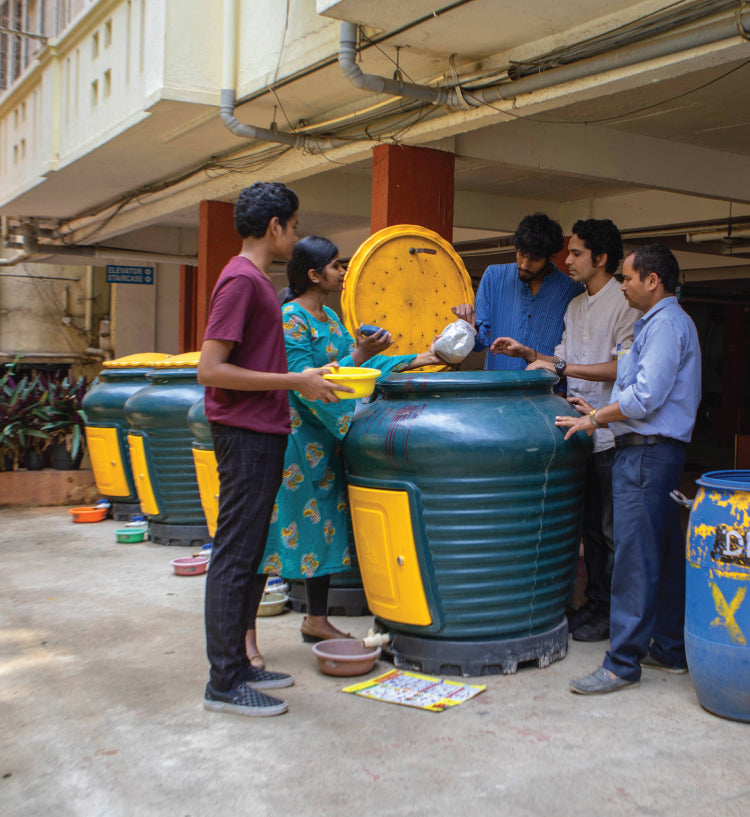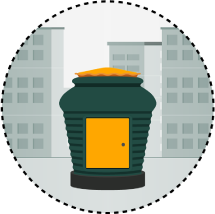OWC Aaga 550 Compost Kit| Speedy smell-free Bulk Organic Waste Converter
| Dimensions (inches) | 42"Dia x 38"H |
| Contents | 1 composter |
| Capacity | 18kg wet waste daily - per pair of Aagas |
| Material | UV stabilised, roto moulded plastic |
| Usage | outdoor space with good ventilation |
| Ideal for | apartments, offices, resorts & all community institutions |
The Aaga is an aerobic 'hot pile' decentralised bulk waste composter. It makes composting simple, labour-saving and hassle free for apartments, offices, resorts & all community institutions. Daily Dump offers demos for community members to clarify questions and ensure informed decision-making in your community. We also provide detailed, hands-on training for housekeeping staff to ensure smooth functioning. You can install it on terraces, open spaces and near the entrance. The internal 'breathing tower' regulates air flow and ensures no foul odour. Ergonomic design allows easy harvesting of compost. The Aaga is a product that your housekeeping staff will be happy to use. By getting your community to use it you will inspire others and create a living lab for your children learn hands-on.
Directions for use
- The Aaga composter has to be used in series, starting with 1 pair for every 18kg
- Add daily organic waste (from kitchen & garden).
- Contents do not need to be mixed, stirred or shifted.
- Layer with adequate Remix Powder daily for smell-free, odour-free composting.
- Harvest compost after 4 weeks (first cycle) and then every 2 weeks.
This is a design copyright product. Approved by Pollution Control Board. Designed and Built in India for India. Price stated is for only 1 Aaga in Bengaluru. Accessories and Services will be extra. Any other products or accessories shown in the photographs are for representational purpose only.
OWC Gaia 800 Compost Kit | Speedy, smell-free Bulk Organic Waste Converter
| Dimensions (inches) | 40"H x 35"B x 35"W |
| Contents | 1 composter + Base |
| Capacity | 18kg wet waste daily - 1 Gaia |
| Material | UV stabilised, roto moulded plastic |
| Usage | outdoor space with good ventilation |
| Ideal for | apartments, offices, resorts & all community institutions |
The Gaia is an aerobic 'hot pile' decentralised bulk waste composter. It makes composting easy, fast, labour-saving and cost-effective for apartments, offices, resorts & all community institutions. Daily Dump offers demos for community members to clarify questions and ensure informed decision-making in your community. We also provide detailed, hands-on training for housekeeping staff to ensure smooth functioning. You can install it on terraces, open spaces and near the entrance. The internal 'breathing towers' regulates air flow and ensures no foul odour. Ergonomic design allows easy harvesting of compost. The Gaia is a product that your housekeeping staff will be happy to use. By getting your community to use it you will inspire others and create a living lab for your children learn hands-on.
Directions for use
- The Gaia composter has to be used in series, starting with 1 for every 18kg of organic waste.
- Add daily organic waste (from kitchen & garden).
- Contents do not need to be mixed, stirred or shifted.
- Layer with adequate Remix Powder daily for smell-free, odour-free composting.
- Harvest compost after 3 weeks (first cycle) and then every 2 weeks.
This is a design copyright product. Approved by Pollution Control Board. Designed and Built in India for India. Price stated is for only 1 Gaia in Bengaluru. Accessories and Services will be extra. Any other products or accessories shown in the photographs are for representational purpose only.
Gobble Max Compost Kit | Effortless smell-free compost bin for homes & offices
| Dimensions (inches) | 50"H x 25"B x 31.5"W |
| Contents | Full Kit = 1 composter unit + stand + Cocopeat 8 kgs + Compost Microbes 1 kg + Rake + Gloves + Tarpaulin sheet + Plastic drum + plastic bucket +bowl + scoop + User Manual Basic Kit = 1 composter unit + stand + Cocobrick 3 numbers + Compost Microbes 1 kg + Rake + plastic bucket + bowl + User Manual |
| Capacity | 2.5-3kg wet waste daily |
| Material | Outer container HDPE |
| Usage | Outdoor aerobic composting |
| Ideal for | wet waste composting in independent homes, villas, small apartment buildings, small offices and canteens, institutions |
The Gobble Max composter is an aerobic 'hot pile' single unit compost bin. It makes composting simple, labour saving and hassle free for homes, communities, and small offices. Ergonomically designed for ease of use, low maintenance and convenient harvest. Optimal composting happens because of the design of aeration in the Gobble Max. It comes bundled with all accessories so you can start right away.
We provide an intensive hands-on training for community members and housekeeping staff to ensure smooth functioning. You can install it on terraces, open spaces and near the entrance. And even better - it can conveniently be rolled away to different locations!
Directions for use
- Mix cocopeat powder with your daily waste in the provided bucket
- Empty this into the Gobble Max
- Cover with a layer of cocopeat.
- Repeat next day!
- You can harvest black gold in 3 weeks!
This is a design copyright product. Approved by Pollution Control Board. Designed and Built in India for India and the world. Price stated is for
1 Gobble Max @Bengaluru. Transportation extra. For outside Bengaluru enquiries, write to hello@dailydump.org
Any other products or accessories shown in the photographs are for representational purpose only.
Metal Leaf Composter for garden and landscaped areas
| Dimensions (inches) | Height 51" + 4" | Diameter 22" / 32" |
| Material | Mild steel frame with steel square mesh |
| Usage | outdoor- in garden, landscaped area, tree-lined streets |
| Ideal for | mulching and composting dried leaves in home and communities |
If you've never tried composting earlier, starting with leaves might be the easiest way to begin! It is completely easy, fuss-free, smell-free and requires almost no maintenance! A large landscape with many types of trees will need many of these to ensure that no garden clippings and leaves leave the site. Yes you can add branches and palms, make sure you cut them down to size. Gardeners value leaf compost highly for use in lawns, so please do compost your dried leaves, do not burn them and do not cart them to landfill.
Make sure to install your leaf composter on concrete blocks. This is critical to ensure good water drainage and to let it hold weight effectively (Over time the leaf composter can get very heavy and if the ground is soft, it will sink in).
Directions for use
- Add your leaves and garden litter into the composter
- Water it daily. It is very important to keep the leaf pile moist at all times.
- If you add accelerator daily, you will get your first harvest in 4-6 months. (Compost Microbes, Panchagavya, diluted cowdung slurry, EM are all great accelerators).
- Our leaf composters are designed for easy harvesting.
Patterns/colour of the product may vary from that shown in the photograph. Dimensions may vary by ± 1.5inches. Any other products or accessories shown in the photographs are for representational purpose only.
Bamboo Leaf Composter for home and community gardens
| Dimensions (inches) | 28" Dia / 32" Dia |
| Material | Mild steel frame with bamboo |
| Usage | outdoor- in garden, landscaped area, tree-lined streets |
| Ideal for | mulching and composting dried leaves in home and communities |
Composting leaves is the simplest and easiest way to begin composting! Leaf composters require almost negligible maintenance while Nature does all the work! The modular design of our leaf composters ensure that you can add just the number you need. We can help you decide.
Leaf compost is great for soil and plants. And our leaf composters help you save your leaves, instead of burning or sending them to landfill. You can read more about the value of composting leaves here.
Directions for use
- Make sure to install your leaf composter on concrete blocks. This is critical to ensure good water drainage and to let it hold weight effectively (Over time the weight of leaves composting can get very heavy and if the ground is soft, it will sink in).
- Add your leaves and garden litter into the composter
- Water it daily. It is very important to keep the leaf pile moist at all times.
- If you add accelerator daily, you will get your first harvest in 4-6 months. (Compost Microbes, Panchagavya, diluted cowdung slurry, EM are all great accelerators).
- Our leaf composters are designed for easy harvesting.
Patterns/colour on the product may vary from that shown in the photograph.Any other products or accessories shown in the photographs are for representational purpose only.
We’ll help your community get started with waste management
Communities that Compost
See how communities across India are making a difference
Choosing a composter is just the first step!
Truly waste sensitive communities have figured out and implemented systems that allow them to manage, maintain and sustain their waste management initiatives. The best systems do not depend on products or people alone, they are process dependent and sustainable in the long run.
-
THE REAL 6 CHALLENGES
Distilled wisdom from our work in the field

-
HOW WE HELP
Helping you implement the best fit solution

-
1. Ownership
Community participation is essential for long term impact. With many competing opinions, points of view and options available, there may be those who say composting is smelly, too expensive or too tedious. The first challenge is getting everyone to see waste as 'my problem'
-
A community with a champion (like you!) is more likely to succeed in taking ownership for managing waste and putting a robust system in place. We have found that children are great ambassadors in residential places and senior leaders are great ambassadors in institutions - so getting them involved is key. Doing fun events (like a waste treasure hunt), quizzez, showing films, giving prizes all help to get buy-in from the comunity. We will also guide you with accurate information on the different options available in the market which helps convince the naysayers!
-
2. Segregation
Segregation at source is absolutely essential for any waste sensitive community. It is the basic 'bare minimum' habit that needs to be inculcated as it ensures that value can be recovered from various materials. Without proper segregation, composting or recycling efforts may not have a long lasting effect. Changing habits is sometime difficult, but where there is a will, there is most certainly a way.
-
1. We run awareness & training sessions for residents and staff to get everyone to start segregating (it's really simple once you start!)
2. We can help implement the system by supplying bins for every home and communciation material that is engaging and easy to follow.
3. We recommend segregation into at least 4 categories - wet (compostable - GREEN), dry (recyclable if kept clean - BLUE), toxic (ewaste, batteries, bulbs - YELLOW) and rejects (sweepings, sanitary waste - RED).
-
3. Collection
Every community faces the challenge of finding a waste collection system that is effective in their context. If door to door collection is not viable due to lack of staff, the home owners or maids need to be trained to dispose the 4 categories of waste correctly.
-
We help you implement an effective collection system and train housekeeping staff to understand and practice this. The right implements (trolley's, buckets etc) which are also key to staff efficiency. When residents have to manage this themselves, we can help you find the best system and get everyone on board.
Daily collection of rejects (RED for municipal truck) and organic waste (GREEN for composting). Weekly collection of dry waste (BLUE for recycling). Residents to drop of Toxic waste YELLOW at a common collection point (to be given to the right agency for safe dismantling and reuse).
-
4. Storage
It might take some time for residetns to become comfortable with the idea of multiple bins - even through it's so simple! Wet and reject waste need to be disposed daily while dry waste and e waste require some storage.
-
1. Sanitary waste in large quantities needs to be picked up daily by an authorised vendor for a fee (gets incinerated), or by the municipal truck (goes to landfill). So try to make sure storage of this is near the gate where pick up is easy and it does not need to be hauled further.
2. The best place for common e-waste storage tends to be in the basement. Bulbs and tubelights need special care and must be stored in a separate bin to avoid breakage and mercury contamination. We can connect you with authorised e-waste vendors who reuse / dispose of both e-waste and bulbs safely. You will need to pay for this service.
3. The dry recyclable waste can be stored together for vendors to pick up, or further segregated and stored if you want a better price. For example: Segregate dry waste into plastic (thin) plastic (hard) Paper, cardboard and others. This will make the conservancy workers work easier.
4. Organise a clothes, toys, bulky items drive once in a month and either donate these or get a recyler to pick it up. You may need to pay them for this service.
-
5. Recycling
The biggest challanege seems to be getting every household to keep dry waste clean and dry (that means plastic packets which have food have to be rinsed and dried or thrown out with rejects - soiled packets are not valuable to a recycler. Milk packets need to be rinsed and stored. Another challenge is reaching a recycler or finding an agency who will come to collect aggregated dry waste.
-
We can connect you with agencies who will come and collect dry waste once a month. There are many communitites who get paid for their dry waste and invest it in a composting system to recover costs. There are some very enterprising communities whose associations run in profit thanks to perfect segregation and recycling set up that generates a lot of vaue for their community and recyclers. Space to aggregate dry waste and value based segregation generates the most returns. This needs a few committed comunity champions to push through the hurdles!
-
5. Thinking long term
Often segregation and composting systems are set up by enthusiastic ommunity members or leaders only to slowly fizzle out when a manager changes or the association president is reelected. Having long term vision for your waste management project and keeping it going over until it becomes second nature continues to be a challenge.
-
We have found that the best systems are those that do not depend on one person, the asssiation or facilities manager to function efficiently. The approach should be to implement well thought through processes that work for everyone. Habits need to then develop around these processes to that a long term shift in thining and behavioural change is possible. Daily Dump's expertise is in enabling people to see waste differently so waste management is no longer a chore but a fun and engaging activity with long term returns. The best long term impact we can hope for is when good waste management practices become second nature for the next generation.
What will your community do with your done compost?

Here is something most people do not know: Our cities are designed to manage poison (mixed waste is just that). We have a budget, land alloted, trucks for transportation of poison. Our cities are not designed to manage nutrition. So when you make all this compost rich in nutrition, you will struggle to reach it to a farmer or a park; because transportation costs are not cheap.
In some cities we are also working on a way to connect you to farmers who will use this organic rich material. If you can help, do let us know. :)
















